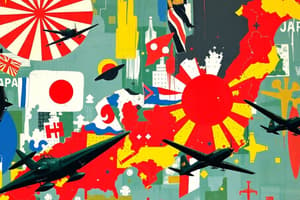Podcast
Questions and Answers
The Treaty of Versailles at the end of World War I imposed light reparations on Germany.
The Treaty of Versailles at the end of World War I imposed light reparations on Germany.
False (B)
World War II ended in 1945.
World War II ended in 1945.
True (A)
The Axis Powers in World War II included Germany, Italy, and the Soviet Union.
The Axis Powers in World War II included Germany, Italy, and the Soviet Union.
False (B)
The Battle of Stalingrad took place between 1942 and 1943.
The Battle of Stalingrad took place between 1942 and 1943.
The D-Day landing occurred in August 1944.
The D-Day landing occurred in August 1944.
The aftermath of World War II did not bring any significant changes in international politics.
The aftermath of World War II did not bring any significant changes in international politics.
The United Nations was established after World War I.
The United Nations was established after World War I.
Many countries did not undertake substantial reconstruction efforts post-World War II.
Many countries did not undertake substantial reconstruction efforts post-World War II.
The psychological and philosophical impacts of World War II did not influence future generations.
The psychological and philosophical impacts of World War II did not influence future generations.
World War II had no lasting effects on the modern world.
World War II had no lasting effects on the modern world.
Flashcards are hidden until you start studying
Study Notes
World War II
World War II was a global conflict that lasted from 1939 to 1945, involving most of the world's nations—including all of the great powers—eventually forming two opposing military alliances: the Allies and the Axis. It was the deadliest conflict in human history, with an estimated 70 million fatalities, including civilians and military personnel. This section explores key aspects of this war.
Causes of World War II
The roots of World War II can be traced back to the Treaty of Versailles at the end of World War I, which imposed heavy reparations on Germany while allowing it to maintain its army under strict limitations. This created resentment among many Germans, who felt they had been treated unfairly. Additionally, the economic instability following World War I contributed to the rise of extremist political parties throughout Europe, such as Nazi Germany.
Major Combatants
The major combatants in World War II were the Axis Powers (Germany, Italy, Japan) and the Allied Powers (United States, United Kingdom, Soviet Union). Each side had various allies that joined them in different stages of the war.
Military Operations
World War II saw several significant campaigns and battles across multiple fronts. Some of the most notable ones include the invasion of Poland by Germany in September 1939, the Battle of Stalingrad between 1942 and 1943, D-Day landing in June 1944, and the atomic bombings of Hiroshima and Nagasaki in August 1945. These events played crucial roles in determining the outcome of the war.
Aftermath of World War II
The aftermath of World War II brought about significant changes in international politics, society, and culture. The United Nations was established to promote peace and cooperation between nations. Many countries experienced substantial reconstruction efforts and shifts in domestic policies. Furthermore, psychological and philosophical impacts of the war influenced future generations, shaping their perspectives on conflict resolution and diplomacy.
In conclusion, World War II was a pivotal moment in human history that shaped our understanding of warfare, international relations, and global cooperation. Its causes, main participants, key battles, and lasting effects have left a profound impact on the modern world.
Studying That Suits You
Use AI to generate personalized quizzes and flashcards to suit your learning preferences.




